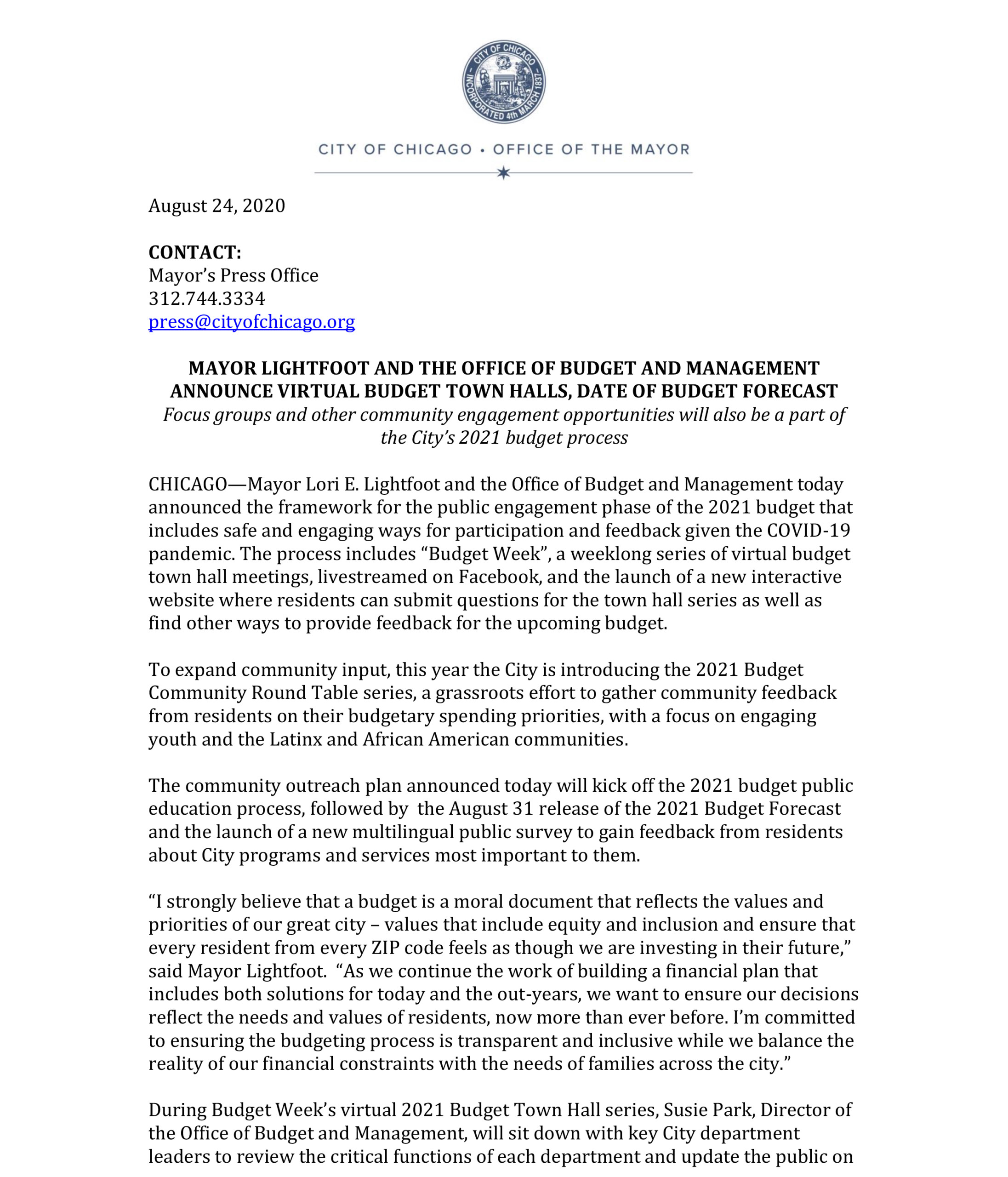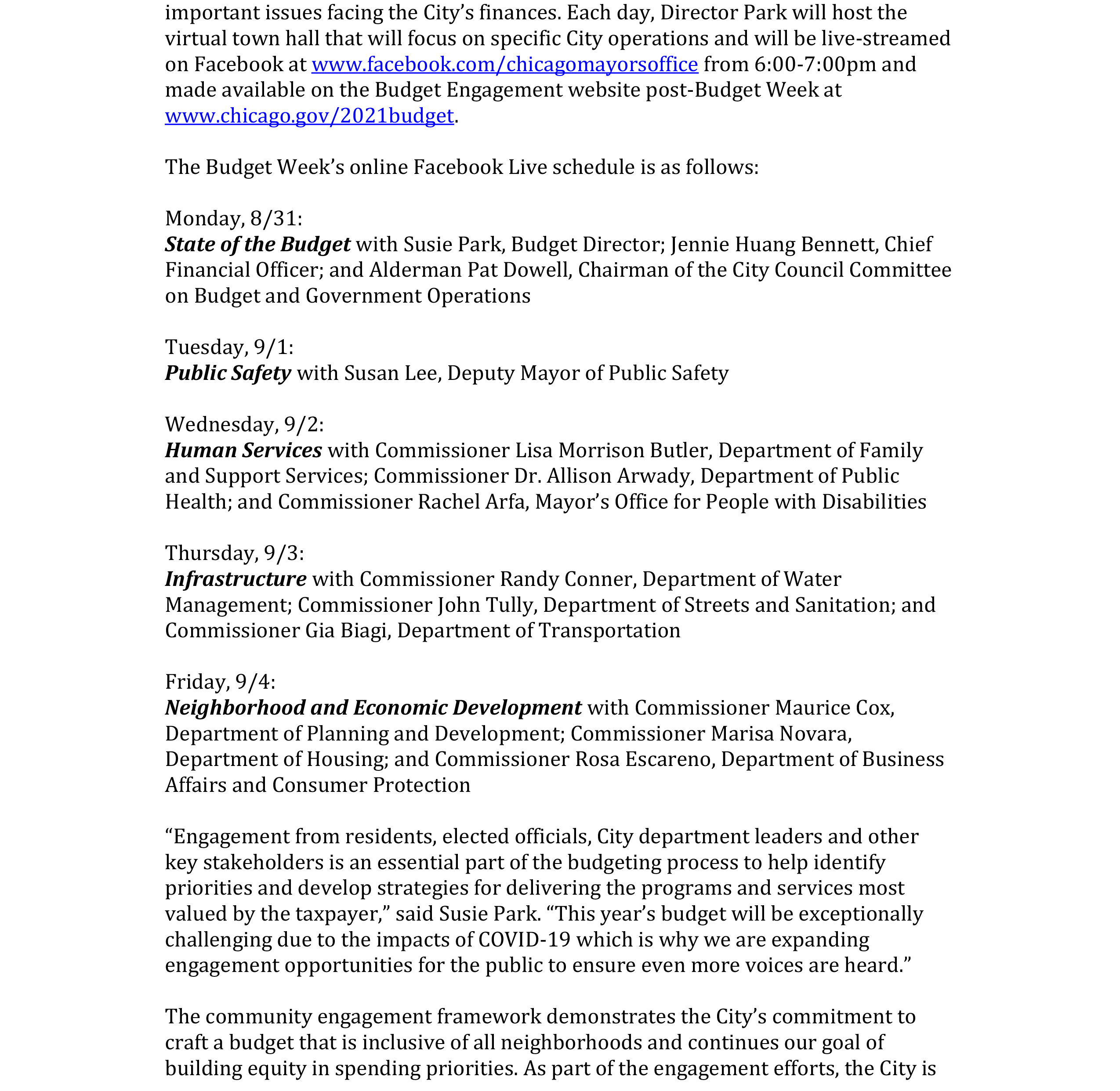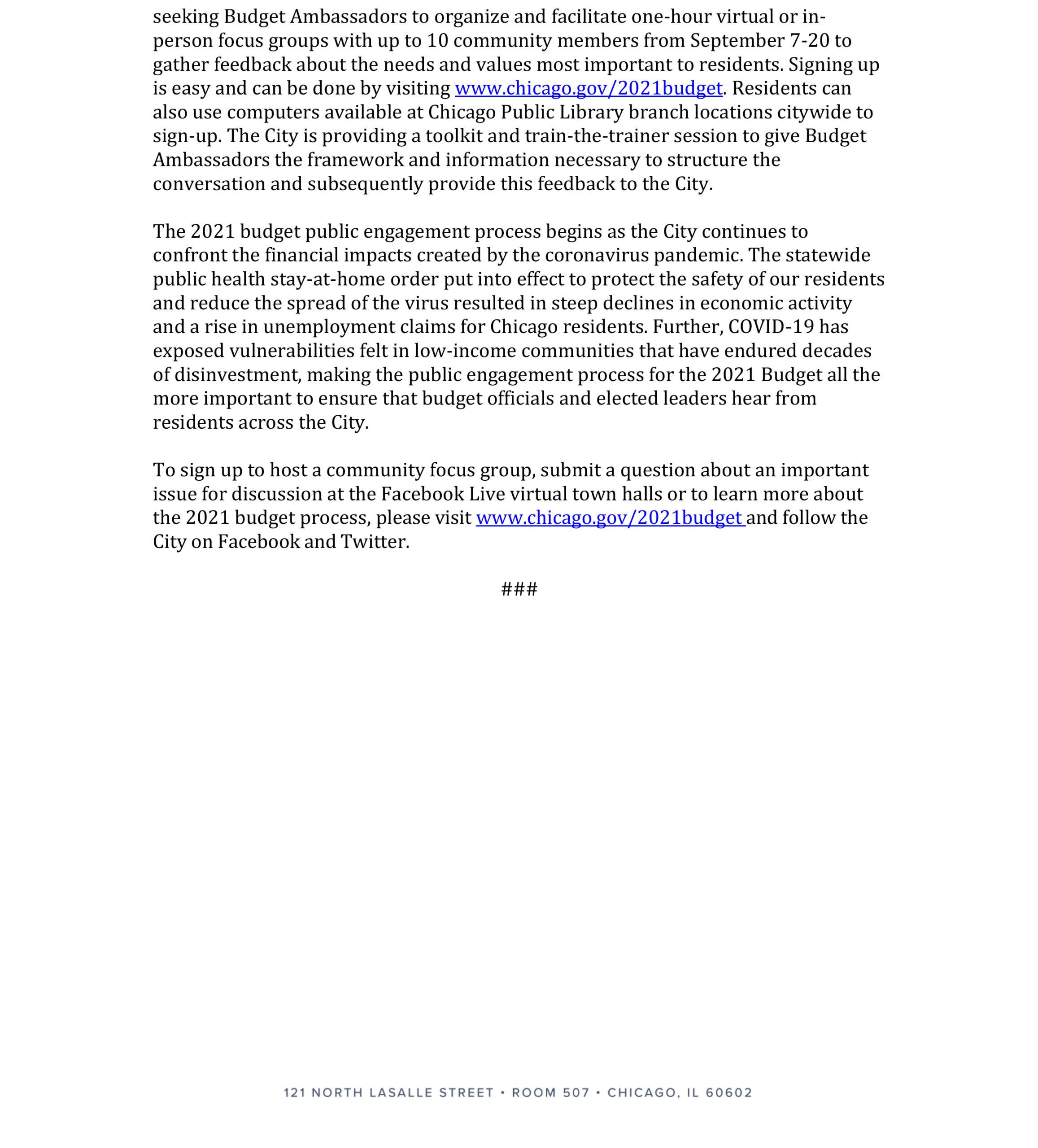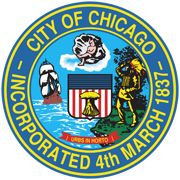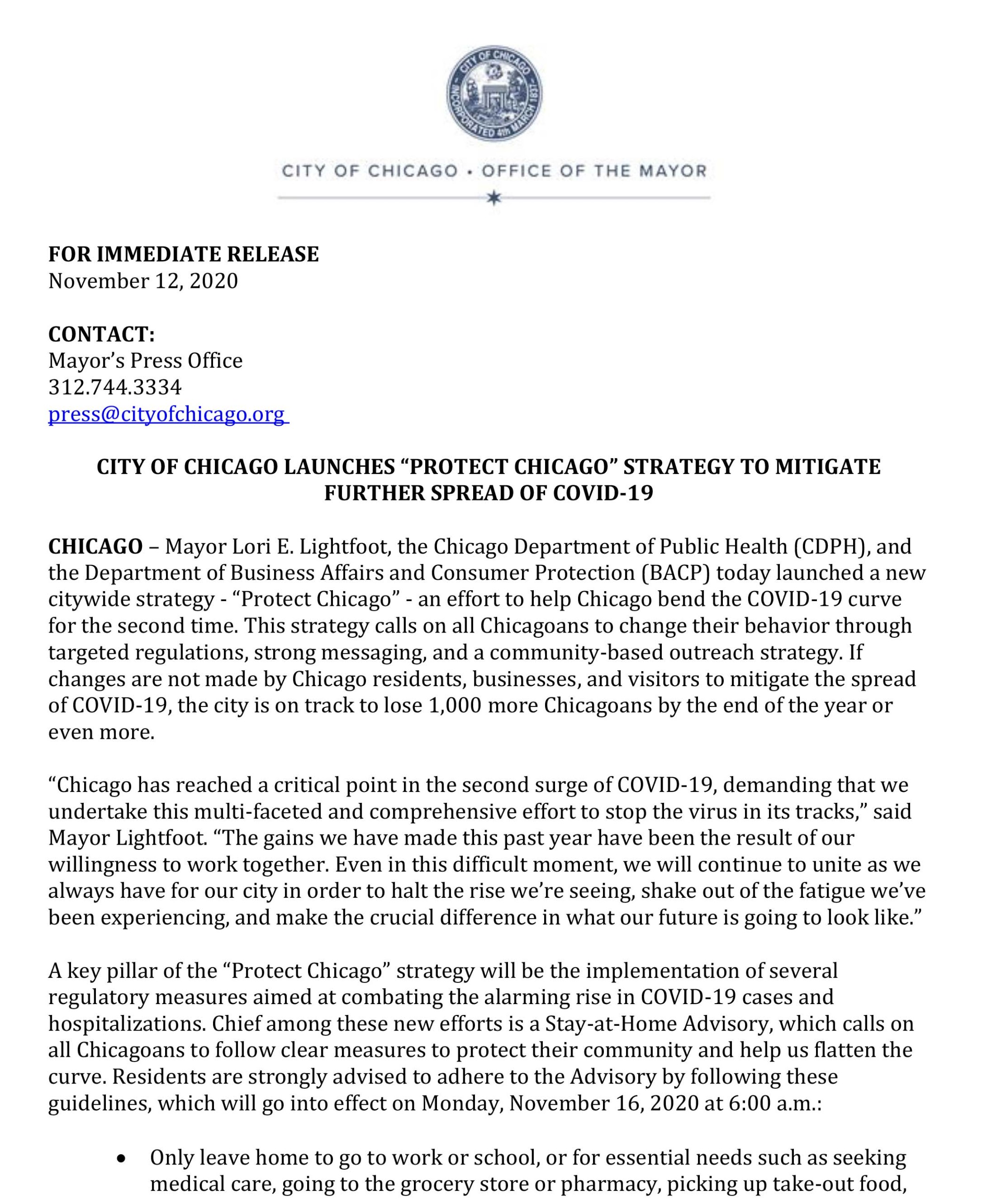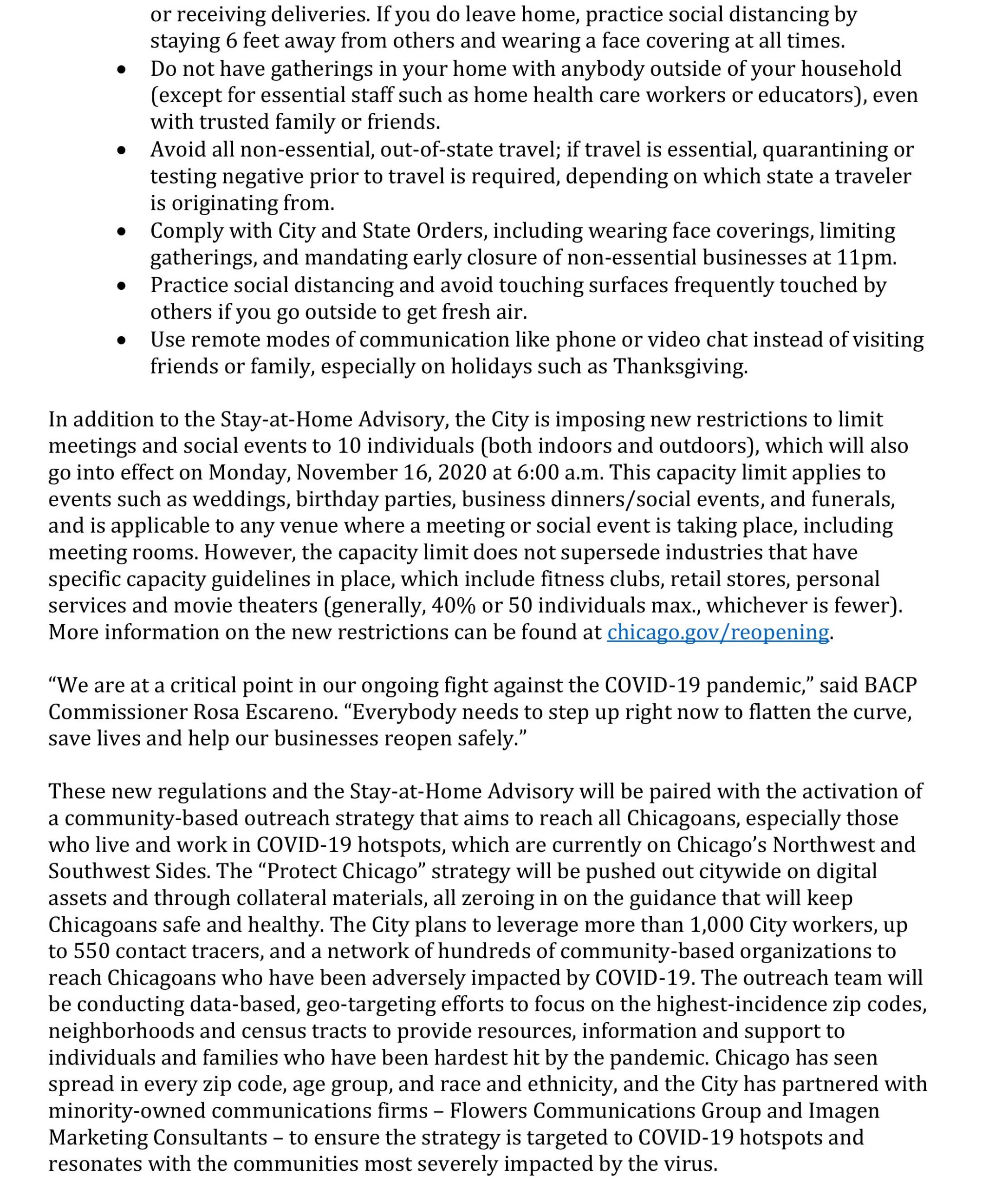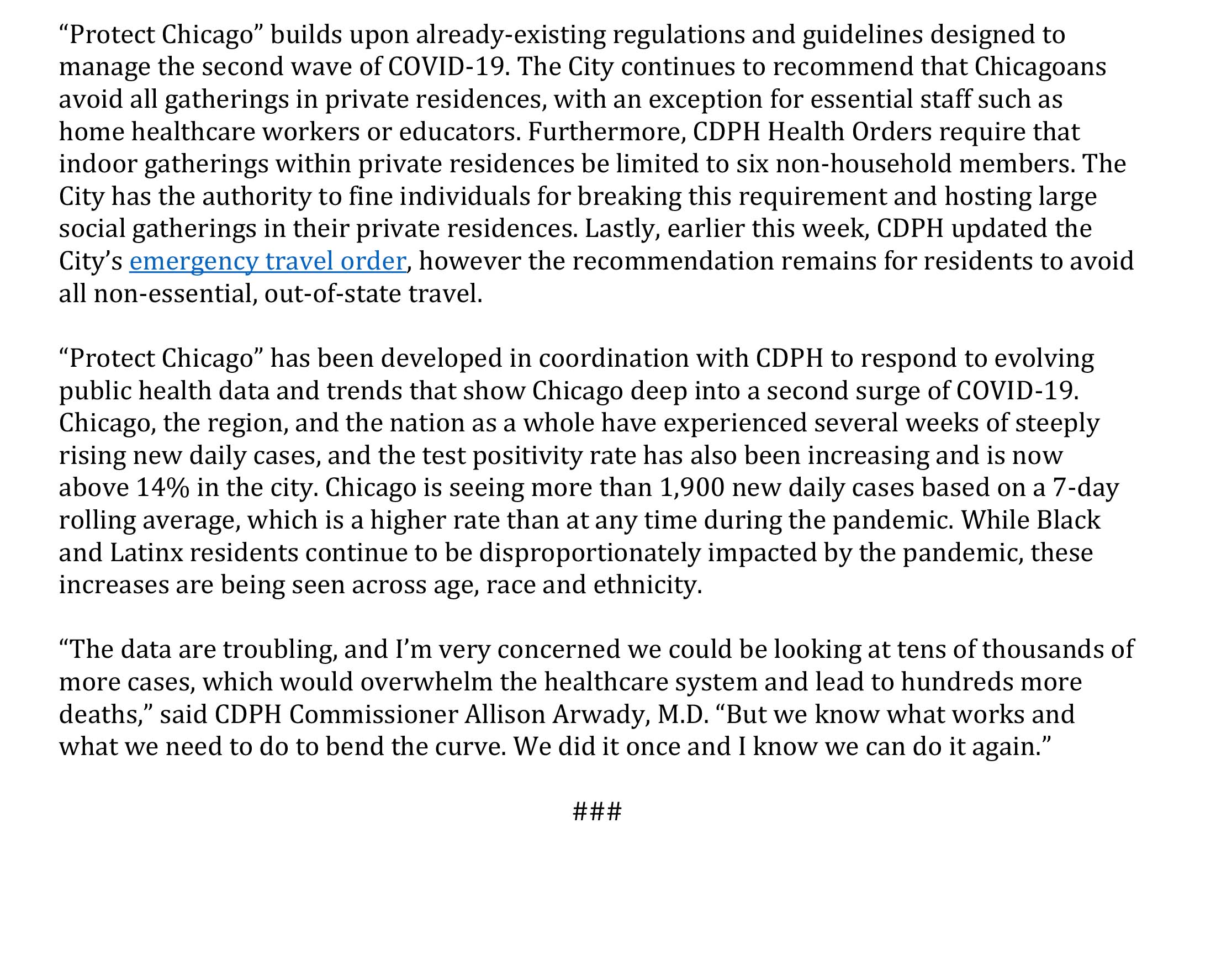Articles under Coronavirus Updates
MAYOR LIGHTFOOT AND CDPH COMMISSIONER DR. ARWADY SOUND THE ALARM ON SECOND WAVE OF COVID-19
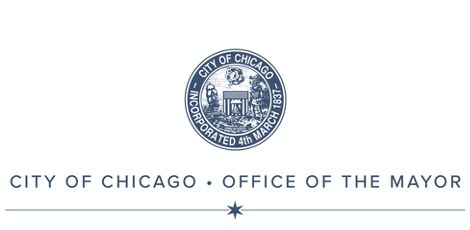
FOR IMMEDIATE RELEASE
October 19, 2020
CONTACT:
Mayor’s Press Office
312.744.3334
press@cityofchicago.org
MAYOR LIGHTFOOT AND CDPH COMMISSIONER DR. ARWADY SOUND THE ALARM ON SECOND WAVE OF COVID-19
Cases, positivity rate and hospitalizations all on the rise over the past two weeks; City considering measures to reverse the increase, including renewed restrictions on businesses
CHICAGO – Mayor Lori E. Lightfoot today joined Chicago Department of Public Health (CDPH) Commissioner Allison Arwady, M.D., to sound the alarm on the worrying trends across COVID-19 health metrics, including a significant rise in cases, positivity rate and hospitalizations. Over the past two weeks, cases have risen by more than 50%, to over 500 per day. This is the most cases per day seen in Chicago since late May, the tail-end of the pandemic’s first wave, and is coinciding with a worrying increase in hospitalizations, which are also up 25% for non-ICU COVID patients and suspected cases since September 22. To combat this second wave of COVID-19, Mayor Lightfoot is calling on all residents to wear masks and strictly limit social gatherings, even small ones. In a gathering of only 10 people, there is a 14% chance that someone is currently infected with COVID-19. To further fight the spread of COVID-19, the City is considering additional measures in the
coming days, including bringing back restrictions on businesses.
“The data is clear – we are now in a second surge of COVID-19 and I am extremely concerned,” said Mayor Lightfoot. “Now is the time to double down on what we know works and come together as a city to flatten the curve once again. Everyone must do their part to keep themselves and others safe and help us overcome this deadly disease.”
Over the last two weeks in particular, Chicago has seen an alarming increase across COVID-19 health metrics. While this increase has coincided with an increase in testing, with close to 11,000 tests now completed each day, the test positivity rate has also increased more than a percentage point to 5.2%. This indicates that the increase in testing does not fully explain the rise in cases. Furthermore, hospitalizations, a measure of severe outcomes which often lags behind an increase in cases, are up to 313 per day citywide. Deaths, too, usually lag an increase in cases and hospitalizations, so City officials are expressing great concern over the possibility of a further increase. Over 3,000 Chicagoans have died from COVID-19.
“I’m deeply concerned about these trends and worried that we’ve got some COVID fatigue setting in where people are not following the public health guidance as they should. This virus doesn’t care who you are, it’s just looking to spread, and if we give it the opportunity to do so it will,” said Dr. Arwady. “Most troubling is the fact that COVID-19 continues to have a disproportionate impact on Black and Latinx individuals, and those with under-lying medical conditions. But we’re seeing a rise in cases across the city and across all races and ethnicities, so we all need to rededicate ourselves to combatting this epidemic.”
Mayor Lightfoot and Dr. Arwady are calling on all residents to recognize the seriousness of this second wave of COVID-19 and take the necessary personal steps to stem the tide. Specifically, all residents need to wear masks or face coverings anytime they are in a public space or unable to maintain six feet of social distancing. Furthermore, residents should avoid social gatherings, even small get-togethers. The more individuals that are a part of your “bubble”, the greater the risk of COVID19 transmission. In a gathering of ten people, there’s a 14% chance one person in that group has COVID-19.That means one out of every seven gatherings of ten people has COVID-19 present. This likelihood of someone having COVID-19 increases as gathering sizes grow – there is a 50% chance that someone in a gathering of 50 people has COVID-19. The majority of COVID-19 cases in Chicago are spread between people that know each other, so the best way to stem the tide is to avoid social gatherings and keep your bubble small.
To further fight the spread of COVID-19 and save lives, the City is prepared to take drastic but necessary steps in the coming days. This may include a rollback of COVID-19 reopening regulations for businesses, including potentially restricting capacity and limiting total gathering size and/or returning to Phase Three of the reopening framework.
“Chicago is at a critical moment in the ongoing fight against COVID-19,” said Dr. Nancy Glick of Sinai Health System’s Infectious Disease Division. “We have learned a great deal about this virus since the first surge, including what works to stop the spread. It is more important than ever to commit to those strategies – wearing a mask, limiting social gatherings and ultimately saving lives.” The significant increase of COVID-19 in Chicago corresponds with a second wave of the virus throughout the entire Chicagoland region, across Illinois, in other Midwestern states and throughout the country. As a reminder, the City’s Emergency Travel Order currently covers 26 states and territories, including Wisconsin and Indiana. Chicagoans are urged not to travel to these states and territories, and if they do they are required to quarantine for 14 days upon their return, unless they are an essential worker traveling for business. For Wisconsin and Indiana, the Order applies to individuals coming from Wisconsin or Indiana to Chicago for non-work purposes and Chicago residents returning from Wisconsin or Indiana, unless they are deemed an essential worker. To learn more, visit chicago.gov/coronavirus.
###

MAYOR LIGHTFOOT ANNOUNCES TWO WINS FOR CHICAGO’S RESTAURANT INDUSTRY

FOR IMMEDIATE RELEASE
October 8, 2020
CONTACT:
Mayor’s Press Office
312.744.3334
press@cityofchicago.org
MAYOR LIGHTFOOT ANNOUNCES TWO WINS FOR CHICAGO’S RESTAURANT INDUSTRY: DOORDASH’S $500K SUPPORT FOR WINTERIZATION AND THE
WINNERS OF THE WINTER DINING CHALLENGE WITH BMO HARRIS BANK ANDILLINOIS RESTAURANT ASSOCIATION
DoorDash will provide financial support to help cover costs of winterizing outdoor dining; and Heated “Japanese-style” Tables, outdoor Block Party and Cozy Cabins came out as the top
winners of this first-ever winter design competition
CHICAGO – Mayor Lori E. Lightfoot today announced two significant developments in support of Chicago’s restaurant community. First, in collaboration with the Illinois Restaurant Association (IRA), DoorDash will be providing $500,000 in financial support to Chicago restaurants to help cover the costs of winterizing their outdoor dining areas. Second, in partnership with BMO Harris Bank and the IRA, the Mayor also announced today the winners of the Winter Design Challenge – a first-ofits-kind competition for community members to reimagine the winter outdoor dining experience in Chicago. After receiving over 600 submissions, a team of judges that included architects, designers, chefs, restauranteurs and servers selected three ideas that not only capture the spirit of Chicago but can provide feasible and safe options for Chicagoans to enjoy dining out as temperatures drop.
The winners of the Winter Design Challenge are:
- Amy Young, ASD | SKY, Cozy Cabins: Small modular, adjoining ‘cabins’ that fit within the footprint of a standard parking space.
- Neil Reindel, Block Party: A flexible approach to outdoor dining that is adaptable and easy to implement for many different sites and street configurations.
- Ellie Henderson, Heated Tables: Modify the Japanese Kotatsu, an economical way to keep warm and cozy in cold months.
“As we approach the winter months and adapt our COVID-19 response accordingly, we owe it to our restaurants to make sure they have what they need to continue keeping their doors open and serving their communities,” said Mayor Lightfoot. “Thanks to IRA and the outstanding creativity of our Winter Dining Challenge winners, we will be able to not only make this a reality, but do soin a way that is safe and showcases our City’s innovative spirit. I extend a huge congratulations to each of our Winter Dining Challenge winners. Thanks also to DoorDash for investing in Chicago and its restaurants to assist them in continuing to serve Chicagoans this winter.”
Over the course of two weeks, 643 submissions were received on global design firm IDEO’s open innovation platform. After two preliminary rounds of reviews by IDEO and City departments, a final 26 submissions were chosen for the last round of the competition. The City and the IRA then fielded a set of judges with a range of perspectives from the restaurant industry and neighborhood associations. The 26 finalists were then evaluated based on a ration that assigned points for feasibility, innovation, cost efficiency, safety adherence and functionality of the idea.
“We are excited to have had the chance to reimagine our public spaces and provide Chicagoans an opportunity to experience the city in a fun and unique way. Chicago has always been a resilient city when faced with difficult times, said Neil Reindel. “With Block Party we wanted to provide a warm place for People to reconnect as we move forward through the winter and into 2021.”“We are honored that our concept was chosen for the Chicago Winter Dining Challenge. Our Cozy Cabins idea focused on creating a warm, welcoming experience to encourage Chicago residents to safely dine in rather than take out,” said Amy Young of ASD | SKY. “We wanted to create an outdoor destination centered around new experiences, neighborhood connections, and a sense of community—elements lost while dining at home. We hope this idea helps support small businesses and safely bring people together during this difficult year.”
The winners of the Winter Design Challenge will each receive a $5,000 cash prize. Additionally, the IRA will be selecting local construction firms that will start the process of bringing these ideas to life. The process will include design development and technical refinement. Once complete, the firms will be able to construct prototypes that can be tested at Chicago neighborhood restaurants in the coming weeks. The IRA will choose those pilot restaurants, and the construction will be paid for with funds that BMO Harris has previously contributed for this purpose.
“We expected that the Winter Design Challenge would attract many great ideas, but the number of unique, innovative suggestions was staggering,” said David Casper, Chair and CEO, BMO Harris Bank. “Supporting our superb restaurants here in Chicago is critical, and I know my BMO colleagues and I are looking forward to dining out throughout the winter.”
The winning designs and other outdoor options can be flexibly adapted for use by restaurants and bars throughout the City in sidewalk cafes, outdoor patios or through the new Expanded Outdoor Dining (EOD) Program that was created specifically to foster outdoor dining during the COVID-19 pandemic. To date, over 400 bars and restaurants have participated in the EOD program to operate in their parking lot, on the sidewalk or in closed streets, and they will have the opportunity to extend these permits to allow for continued operations during the fall and winter months.
“I want to thank the City of Chicago, IDEO and the Illinois Restaurant Association for choosing my winter dining idea,” said Ellie Henderson. “My hope is that my proposal for using heated tables will help restaurants adapt, providing a novel open-air dining experience for their patrons that is safe and comfortably warm through colder months in 2020 and beyond.”
The City has created clear guidelines for outdoor operations as the weather gets cooler. The implementation of the winning designs and other outdoor options must follow these guidelines, which provide clear directions for safe and responsible outdoor service. Restaurants and bars will not need to apply for a new sidewalk café or EOD permit to operate in the winter months, though they do need to ensure that their submitted site plans reflect heating and structure elements. To make it easier for bars and restaurants to continue operating safely and successfully, the City is allowing temporary tents on the public right of way for the first time and temporarily extending the length of tent permits that are typically issued for 60 days to now last 180 days.
To help restaurants and bars operate outside, the City will be holding webinars next week on safe outdoor operations. To register and learn more, visit www.chicago.gov/businesseducation.
In addition to the City’s commitment to supporting restaurants and bars, DoorDash, today announced a new $2 million grant program to help restaurants in select cities prepare for winter and continue to serve customers during colder weather. DoorDash, together with the Illinois Restaurant Association and Mayor Lightfoot, is proud to announce $500,000 in grants for Chicago-area local restaurants as part of DoorDash’s Main Street Strong initiative to help restaurants recover and succeed amidst COVID-19 related challenges.
“Our city’s restaurants are finally starting to move forward, and we have to help them maintain that momentum,” said David London, Head of U.S. East & Federal Government Relations at DoorDash. “DoorDash is deeply committed to supporting our restaurant partners and the communities we serve. This initiative will provide critical financial support to keep restaurants going through the cold weather, and we’re appreciative of the City and IRA’s shared support.”
As winter weather looms on the horizon, Chicago area restaurants will be able to apply to receive a $5,000 grant to defray winterization expenses such as the cost of heating equipment, additional safety materials to improve indoor dining, upgrades for air filtration systems, bulk orders of blankets for patrons, and more. Applications open on October 16, and recipients will be notified by the end of December. To qualify, restaurants must be located in Chicago with three or fewer locations operating currently, 50 employees or fewer in 2019, and $3M or less in 2019 annual revenue per store. Restaurants can find full details and the application on the Hello Alice website beginning October 16th here.
Read more about DoorDash’s efforts to help restaurants adapt to winter temperatures on the DoorDash blog.
While three winners were chosen for the Winter Dining Challenge, there were many other ideas that would also create options for outdoor dining during the winter. The top 60 ideas have been compiled and is available by clicking here. To learn more about the Winter Dining Challenge and see all of the submissions, click here.
###

The Chicago Department of Public Health Launches its Annual Flu Vaccination Campaign
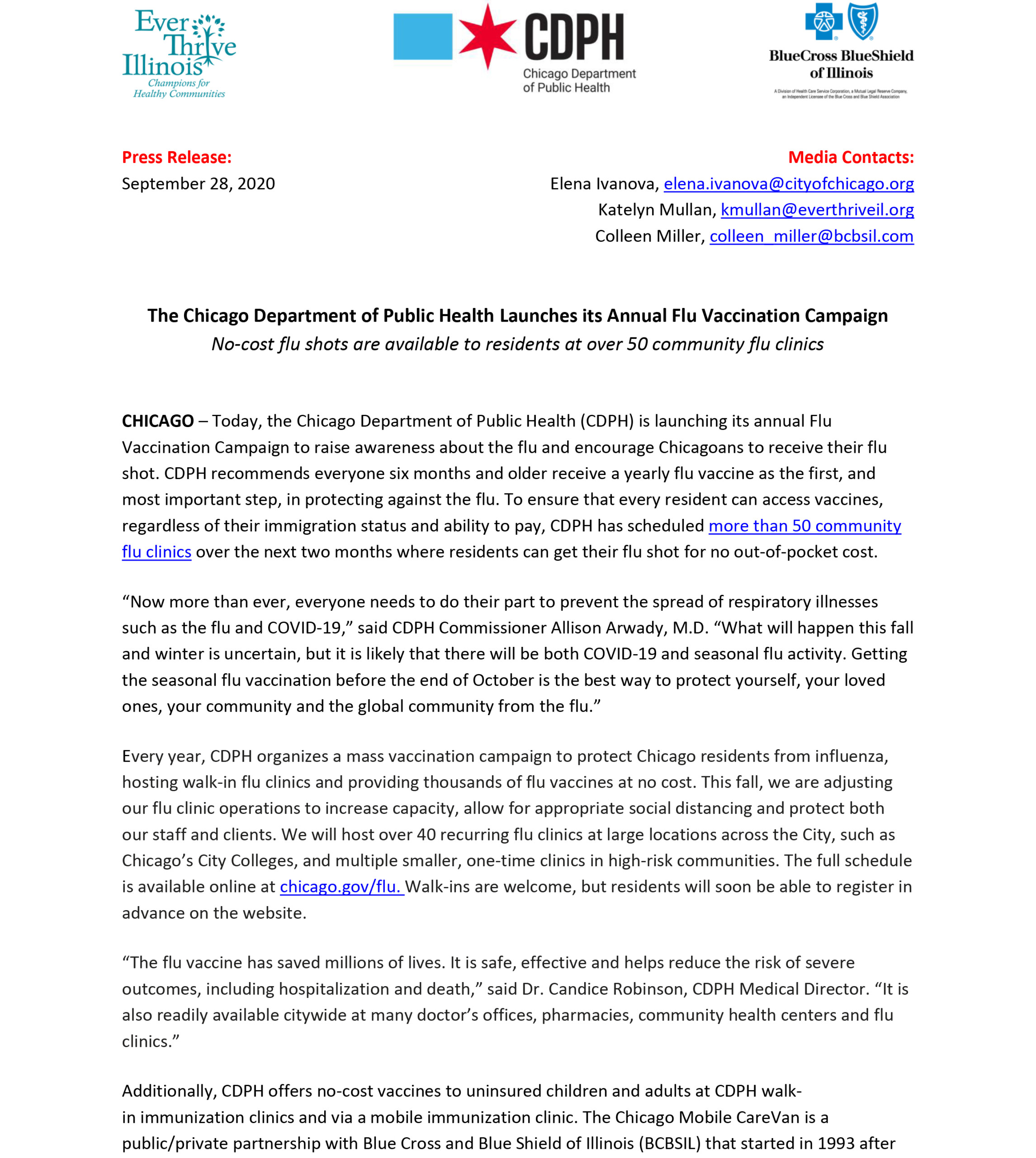
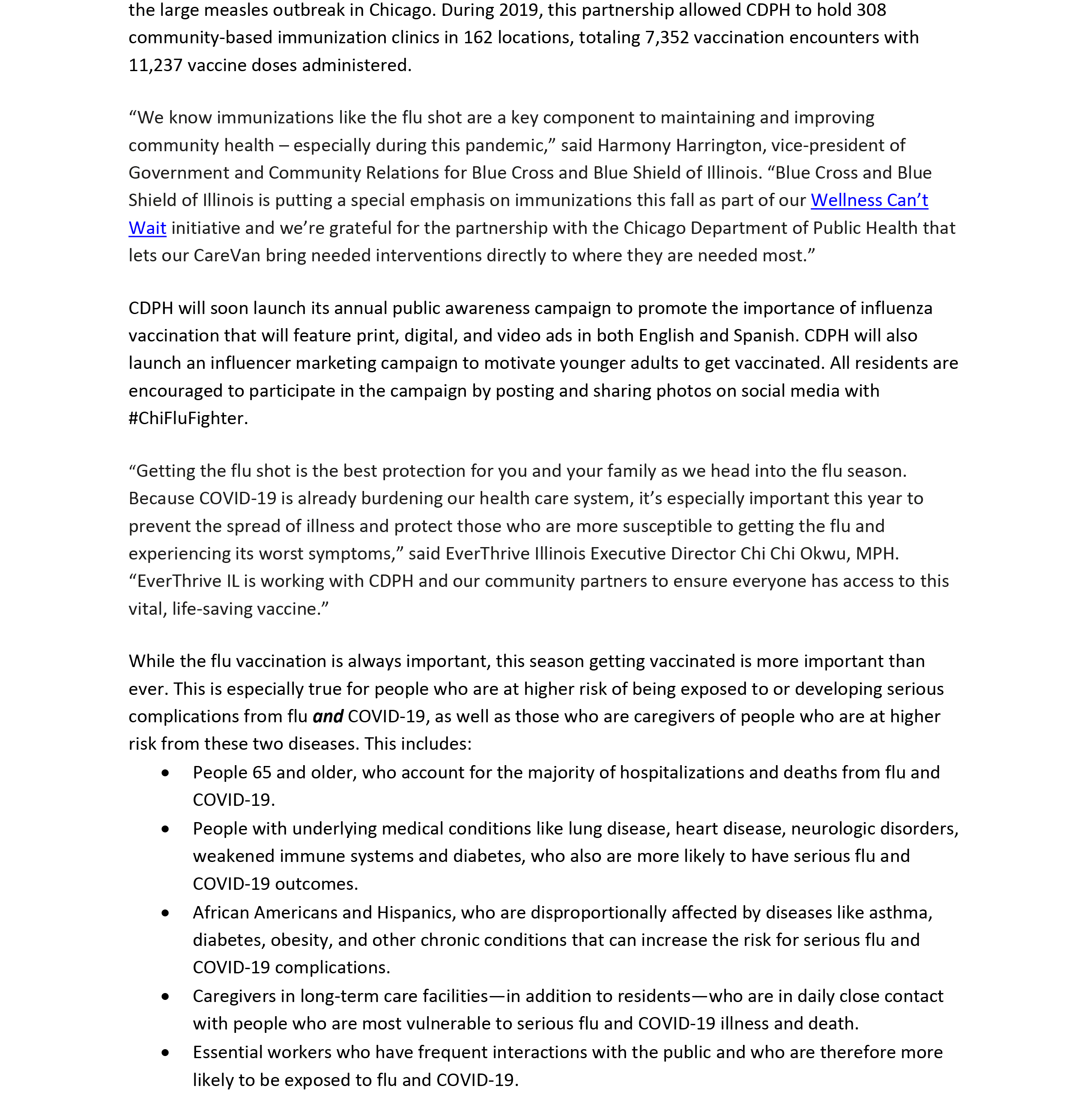
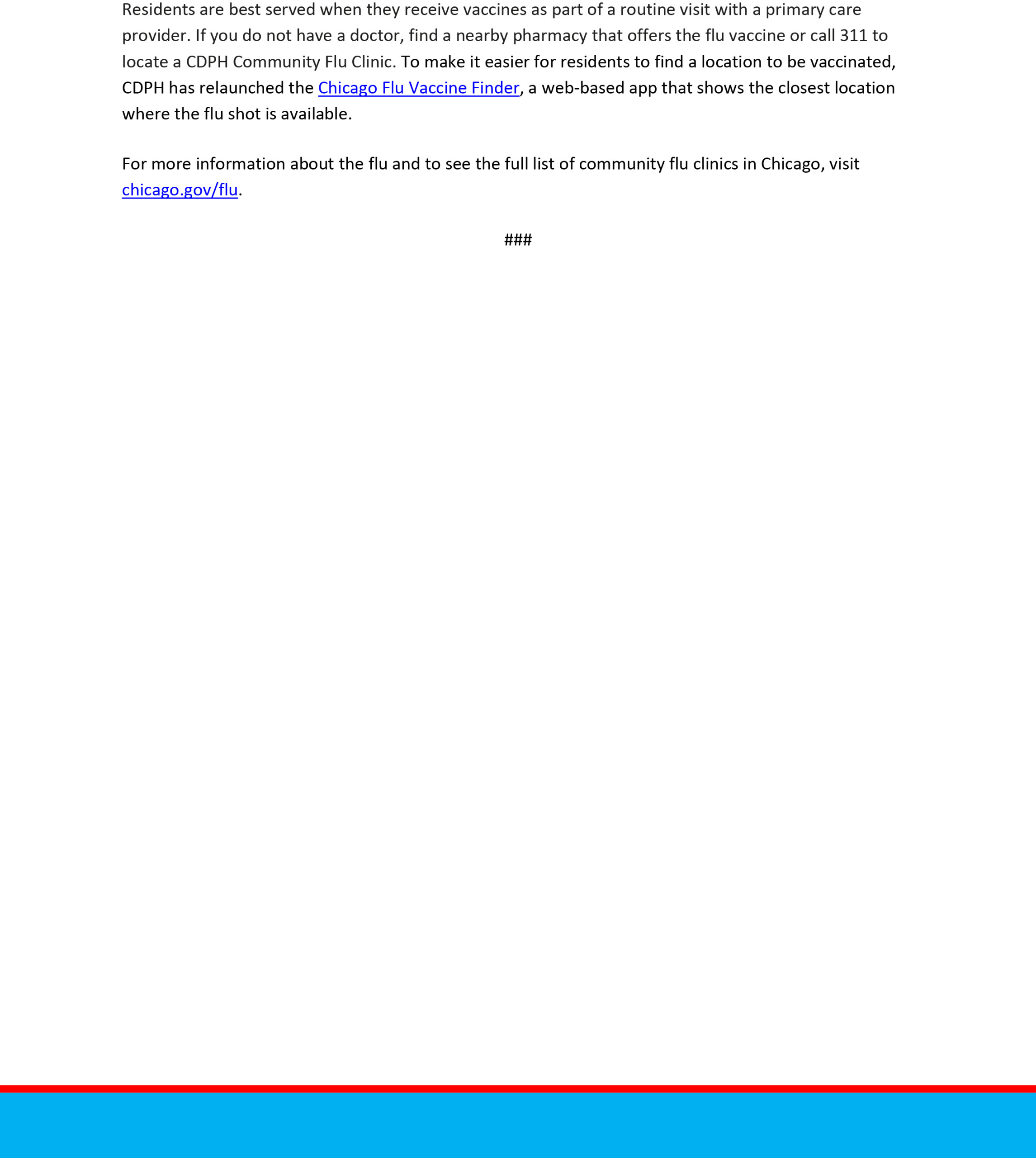
Changes to Reopening Precautions
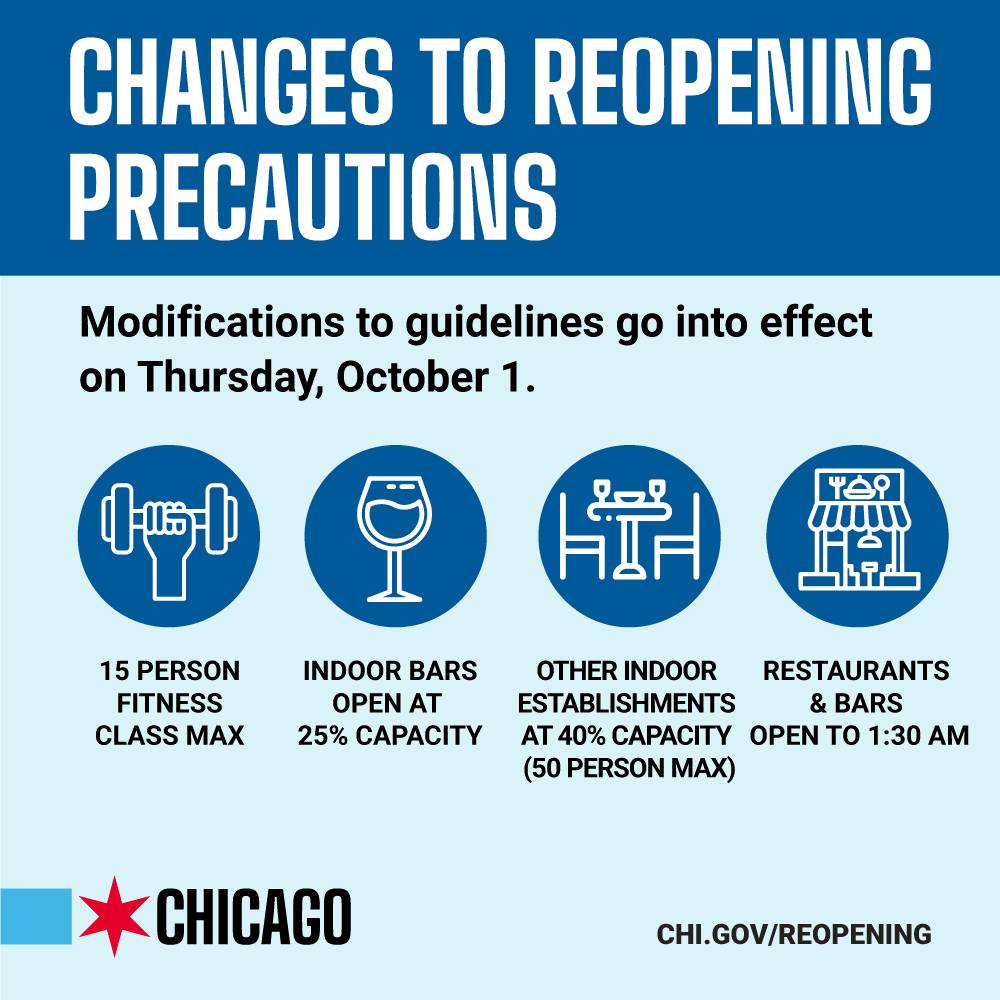
MAYOR LIGHTFOOT ANNOUNCES EASING OF PHASE FOUR GUIDELINES FOR CHICAGO BUSINESSES

FOR IMMEDIATE RELEASE
September 28, 2020
CONTACT:
Mayor’s Press Office
312.744.3334
press@cityofchicago.org
MAYOR LIGHTFOOT ANNOUNCES EASING OF PHASE FOUR GUIDELINES FOR CHICAGO BUSINESSES
Progress in the fight against COVID-19 will allow for expanded indoor capacity, extended operating hours and loosening of other restrictions for businesses beginning October 1st
CHICAGO – Mayor Lori E. Lightfoot, the Chicago Department of Public Health (CDPH) and the Department of Business Affairs and Consumer Protection (BACP) today announced that Chicago has made sufficient progress in the fight against COVID-19 to ease certain restrictions on businesses. Effective Thursday, October 1st , new guidelines for businesses will come into effect that will expand indoor capacity to 40% for certain businesses, reopen bars for indoor service, allow restaurants and bars to serve alcohol until 1:00 am, increase maximum group sizes for fitness classes and after-school programming and allow personal services that require the removal of masks. These changes build on Chicago’s status as one of the most open large cities in America and are possible due to continued improvement on crucial COVID health metrics, including a declining number of new daily cases, a test positivity rate now below 5% and the lowest rates of hospitalization and death in months.
“Over the past six months, we have asked so much of our business community. But each time, our businesses have stepped up to the plate,” said Mayor Lightfoot. “Thanks to this cooperation, we have met this challenging moment with grace, commitment and resilience, and the sacrifices made by our businesses, workers and residents have saved countless lives. This next step in our reopening is good news for business owners as well as the communities they serve and the thousands of residents that work for them.”
Chicago is now seeing around 300 new COVID cases per day whereas in late August the city was over 350 cases per day and rising. Test positivity (the percentage of COVID tests with a positive result) has fallen to 4.5% and severe outcomes have also improved, with hospitalizations from COVID lower than they’ve been since March and deaths at an average of 2-3 per day, when they were around 50 per day at the peak of the pandemic.
The outbreak continues to have a disproportionate impact on Black and, particularly of late, Latinx communities, but we are seeing improvement there, as well, and declines in the Latinx community outpace the overall averages. As we gradually ease our reopening guidelines, we will continue to watch trends closely, particularly among essential workers and People of Color.
“Overall, we are heading in the right direction, and this affords us an opportunity to further re-open the city and to do so gradually and safely,” said CDPH Commissioner Allison Arwady, M.D. “But I can’t emphasize this enough: Chicagoans need to continue to follow the public health guidance – wearing masks, social distancing, frequent hand washing and staying home when sick – or we risk falling back and experiencing another rise in cases.”
Effective Thursday, October 1st, at 5:00am, the following guidelines will come into effect:
- Increased Indoor Capacity: Restaurants, health and fitness centers, personal services, non-essential retail and all other establishments that have been limited to 25% indoor capacity will now be able to increase their maximum indoor capacity to 40%. The limit of 50 total customers within one room or space at restaurants, venues and other establishments will remain in place, as will the limit of no more than six people per table.
- Reopening of Bars: Breweries, taverns, bars and other establishments that serve alcohol without a food license may reopen with indoor seating, at 25% capacity or 50 people, whichever is fewer. Service remains limited to no more than two hours per party, and customers must be seated when eating, drinking or ordering – patrons cannot walk up to the bar to order.
- Extended Hours for Bars and Restaurants: Bars, restaurants and other establishments that serve alcohol will now be able to sell alcohol for on-site or off-site consumption until 1:00 am and may remain open until 1:30 am. Liquor stores, grocery stores and other establishments that sell alcohol to-go through a Packaged Goods license must continue to cease alcohol sales at 9:00 p.m.
- Increased Group Size: Maximum group size for health and fitness classes and after-school programming will increase from 10 to 15 people.
- Expanded Personal Services: Facials, shaves and other personal services that require the removal of face coverings will be allowed.
Updated reopening guidelines can be found at chicago.gov/reopening.
“The last six months have brought unprecedented challenges for everyone, especially the small businesses that form the pillars of so many of our neighborhoods,” said BACP Commissioner Rosa Escareno. “I want to thank the many businesses that have shown their dedication to their employees and patrons throughout this crisis by strictly following our guidelines. While this crisis has brought extraordinary pain, our recovery has outpaced peer cities and I am confident that this next step will bring much-needed economic support for thousands of businesses and workers while still prioritizing the health of our community.”
To help keep communities safe while supporting the neighborhood economy, the City today also today announced a partnership with homegrown technology company Tock to provide free technology solutions for restaurants and bars in lowincome communities. Through this partnership, Tock will offer a free set-up and sixmonth subscription to Tock Plus Lite for restaurants and bars without a reservation system in areas of the city below 60% of the Area Median Income. This one-of-akind program will provide these establishments with the ability to manage reservations, takeout, delivery and events all through one unified system. This program, which is also available at a low cost citywide, can be used by businesses to retain cell phone numbers and email addresses to support contact tracing for reservations and when seating walk-ins.
“As a locally-grown Chicago business, we are thrilled to partner with the City to help expand safe dining and help restaurants build a bridge to the future,” said Brian Fitzpatrick, Tock’s co-founder and CTO. “For many restaurants and bars, especially those in historically disinvested areas, technology can make all the difference. Access to reservation systems during this critical time will help businesses keep pace while ensuring that they comply with regulations to keep their employees and patrons safe.”
While enough progress has been made to ease certain restrictions, Chicago remains in the midst of the COVID-19 pandemic and calls on all businesses and customers to continue following the phase four guidelines. In order to continue the significant progress, the following additional guidelines will also come into effect on Thursday, October 1st:
- When dining out at a food service establishment or bar, customers must always wear face coverings while seated, except when actively eating or drinking. This protects employees that may interact closely with patrons.
- Patrons at indoor bars, taverns and breweries must order from their seats – they cannot walk up to the bar to order.
- Bars, taverns and breweries that are reopening indoors must partner with a food establishment so that food is available to patrons at all times (e.g., making menus available and allowing delivery, allowing patrons to order from third-party delivery services).
- When taking reservations and seating walk-in customers, restaurants and bars should retain an email and/or phone number for possible contact tracing.
- Personal services that require the removal of face coverings are recommended to be kept under 15 minutes, and the employee conducting the service must always wear a face covering.
- All places of business should provide hand sanitizer for patrons and employees to use upon entry.
“The next few months will be critical for Chicago’s hospitality industry as we work to survive a once-in-a-lifetime crisis,” said Sam Toia, President and CEO of the Illinois Restaurant Association. “Increased capacity and longer hours will mean more jobs, greater opportunity for revenue, and a path towards stability for our restaurants. We are committed to continuing to prioritize the health and safety of our workers and patrons as we take this essential next step in our economic recovery.”
These new health and safety regulations are in addition to existing guidelines, including the requirement for diners to continue wearing face coverings when interacting with staff and for residential property managers to limit guest entry to five additional people for single-member households such that total indoor gatherings and parties do not exceed six people. BACP will continue enforcement of these guidelines. Since June 3rd, when phase three began, BACP investigators have conducted 2,064 investigations and issued citations to 132 businesses for failing to follow the reopening guidelines.
“The compliance rate makes it clear – businesses in every corner of the city have taken the steps they need to keep our residents safe,” said Emma Mitts, 37th Ward Alderman and Chairman of the Committee on License and Consumer Protection. “I am proud of our business community and thrilled that increased capacity and extended hours will bring the opportunity for additional revenue. I am glad to be a part of the efforts to help businesses throughout the COVID-19 pandemic and to support this meaningful step forward on our road to a safe and responsible recovery.”
“Our downtown and neighborhood businesses are central to what makes our city great,” said Brendan Reilly, 42nd Ward Alderman. “This next step in our reopening will be a lifeline for thousands of businesses, but we must continue to follow critical health and safety guidelines while we move towards a reopened economy that works for our businesses and workers.”
While indoor service can expand starting October 1st, the City recognizes the continued importance of outdoor options for bars and restaurants as part of a safe and successful fall and winter season. The City has worked with industry experts to develop guidance for safe and responsible outdoor operations, which were distributed to businesses last week. Under these guidelines, tents and other structures will be allowed on the public way for the first time, Expanded Outdoor Dining Permits will be extended to last through the winter season and road closures will continue – weather permitting – in order to allow our small businesses as much time as possible to make up for lost revenues. The outdoor guidance can be found here.
“Our city’s restaurants and service industry team members have suffered a devastating blow as a result of COVID-19 and, while we look forward to fully reopening in the future, we respect that the City of Chicago is using the best public health guidance available to inform their decisions,” said Erick Williams, Owner and Chef of Virtue Restaurant & Bar in Hyde Park. “The safety of our team and guests has and will continue to be our first priority. I am hopeful that increased capacity will allow us to sustain our team as we need continued support to brace our businesses.” To prepare all business owners for the new phase four guidelines and for the cold weather regulations, the City of Chicago will be hosting a series of webinars this week. To register and learn more, visit chicago.gov/businesseducation.
Additionally, the City today is launching an “Eat. Shop. Live Chicago.” campaign to support small businesses. The City and its partners will use this campaign to encourage dining and shopping at small businesses throughout the fall and winter months while highlighting businesses that are operating safely and responsibly. “As business owners, we appreciate the opportunity to show how seriously we take the health and safety of our employees and patrons,” said Abby Phelps, Studio Owner of Club Pilates in Lincoln Park. “We are committed to keeping those priorities top of mind as we increase our capacity to allow more members in our gyms and studios.”
###
Fall and Winter COVID-19 Outdoor Dining Guidance
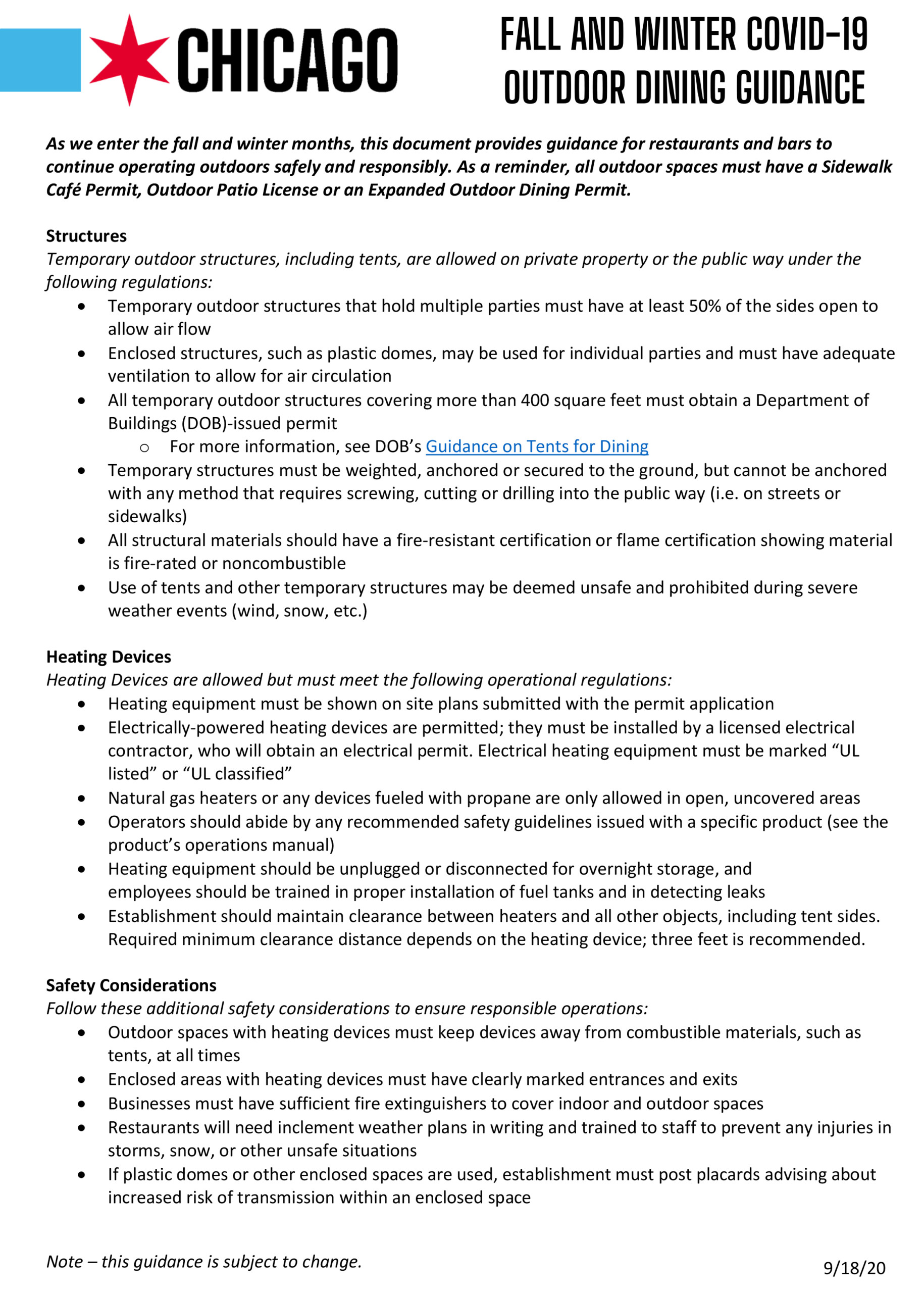
Chicago Travel Quarantine List
As of September 11, travelers from the following states and territories should quarantine upon arrival in Chicago:
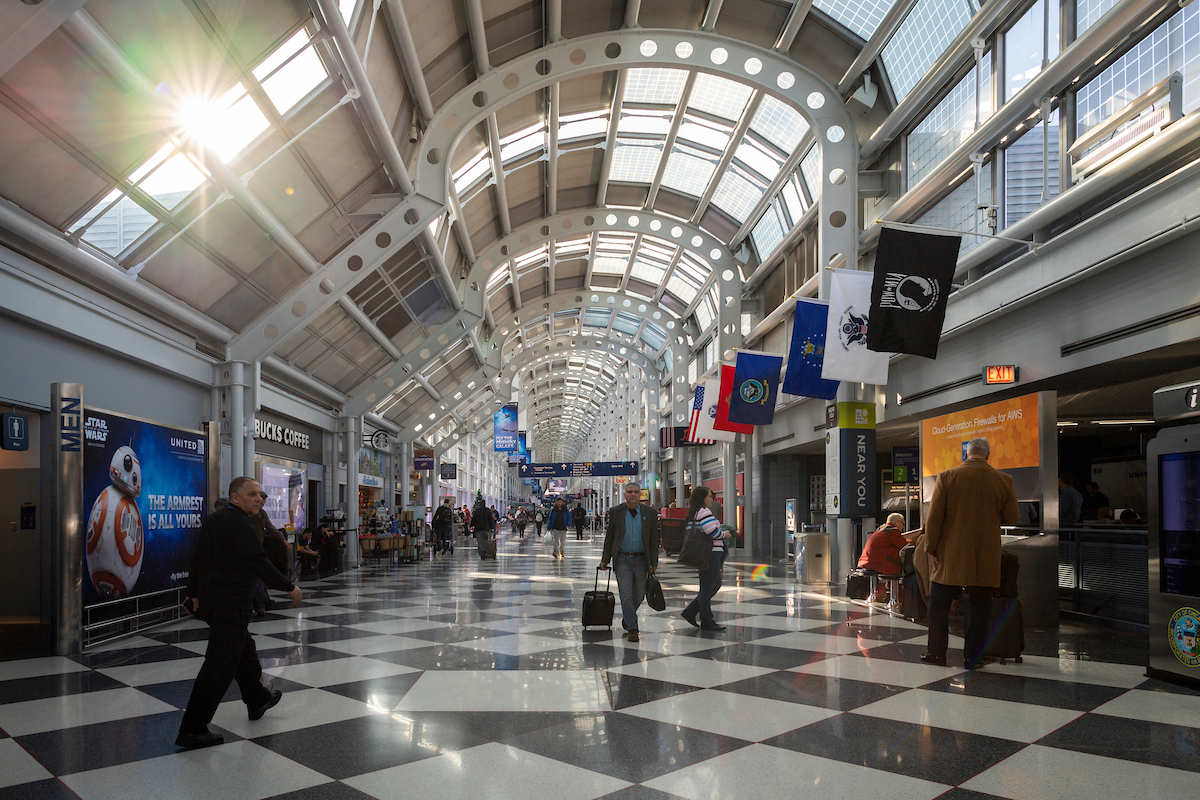
- Alabama
- Arkansas
- Florida
- Georgia
- Hawaii
- Idaho
- Iowa
- Kansas
- Kentucky
- Louisiana
- Mississippi
- Missouri
- Nebraska
- Nevada
- North Carolina
- North Dakota
- Oklahoma
- South Carolina
- South Dakota
- Tennessee
- Texas
For more information, see these Frequently Asked Questions.
Mayor Lightfoot Joins BMO Harris Bank and Illinois Restaurant Association to Launch Winter Design Challenge to Reimagine Winter Outdoor Dining

CHICAGO – Mayor Lori E. Lightfoot, in partnership with IDEO, BMO Harris Bank and the Illinois Restaurant Association, today announced the Winter Design Challenge, a first-of-its-kind competition that will engage community members to reimagine the winter outdoor dining experience in Chicago. The COVID-19 pandemic has brought a variety of challenges to Chicago’s restaurant and bar owners, and the Winter Design Challenge will draw on the expertise and creativity of Chicago residents to propose innovative outdoor dining solutions that adhere to COVID-19 protocols. The Challenge will run from August 25 to September 7, with winners announced in mid-September.
“While we’ve had to implement restrictions and take hard measures to combat a recent rise in COVID-19 activity, we will continue to ensure our restaurants, bars and businesses have the supports they need to survive during these unprecedented times,” said Mayor Lightfoot. “We are asking our community members to come together and think creatively about how we can make outdoor dining feasible in the winter.”
The Winter Design Challenge will use human-centered design principles to generate ideas that are tailor made to suit the needs of Chicago residents and take into account the many stakeholders involved – from customers to restaurant workers to construction trade workers. In partnership with IDEO, a leading global design company, the City will use design thinking to find ideas that are innovative, viable, equitable and feasible.
All City of Chicago residents are invited to participate in the Winter Design Challenge. Submissions will be accepted on IDEO’s open innovation platform. A panel of local restaurants and community members will select one winner in each of the following categories: 1) outdoor, standalone structures 2) indoor-adjacent spaces and 3) cultural shifts making winter dining more appealing. All submissions must comply with local COVID-19 guidelines. Thanks to support from BMO Harris Bank, each winner will receive a $5,000 cash prize and opportunities to pilot their idea at restaurants and bars in the City.
“At BMO Harris Bank, we are committed to investing in our local communities, and we’re here to help support Chicago’s restaurants during this difficult time,” said Eric Smith, Vice Chair of BMO Harris Bank. “We know that Chicago residents are innovative and forward-thinking, and we look forward to seeing their ideas for supporting our restaurants and bars, and I hope that the solutions that come out of the Winter Design Challenge will remain long after the COVID-19 pandemic subsides.”
The Winter Design Challenge builds on Mayor Lightfoot’s efforts to support restaurants and bars during each phase of the City’s re-opening framework. In May, Mayor Lightfoot announced the Expanded Outdoor Dining Program, which has allowed over 300 restaurants and bars to temporarily into the street or private property. This program was recently expanded to allow taverns without a Retail Food Establishment license to expand into the sidewalk area for the first time. In June, Chicago City Council passed Mayor Lightfoot’s reforms to the sidewalk café permit, making it easier and cheaper for restaurants to operate on their sidewalk space. The City is looking for innovative ideas to keep bars and restaurants thriving during the cold winter months.
“Our restaurants and bars are the heart and soul of the city, and we must do everything possible to keep them operational during the harsh winter months,” said Sam Toia, President and CEO of the Illinois Restaurant Association. “We need out-of-the-box thinking to address the hardship facing our industry. The Winter Design Challenge demonstrates the City’s support of innovation in these trying times, and we look forward to ideas that are both creative and operationally attainable for our members.”
To learn more about The Winter Design Challenge, click here.
###
Mayor Lightfoot Announced Virtual Budget Townhalls, Date of Budget Address
